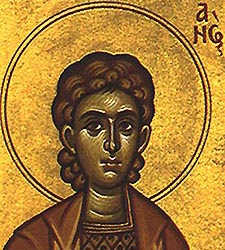|
|||
|---|---|---|---|
| This weekly bulletin insert complements the curriculum published by the Department of Christian Education of the Orthodox Church in America. This and many other Christian Education resources are available at http://dce.oca.org. | |||

Matthew 7:24-8: 4 is an account of Jesus teaching and healing a leper. It begins as Jesus astounds the people gathered to listen to Him. They have never heard another person speak the way He does: "He taught them as one having authority, and not as their scribes." As Jesus comes down from the mountain where He has been teaching, one man emerges from the crowd. This man, a leper, kneels before Him and begs, "Lord, if You are willing, You can make me clean." Lepers were considered to be unclean, and the Old Testament Law even prohibited others from touching them. But just as Jesus has distinguished Himself from the scribes by the manner of His teaching, He now shows Himself to be unhindered by the law of the Book of Leviticus. He answers the leper by saying, "I am willing; be cleansed." As He does so, He touches the man and heals him. According to Church Tradition, Saint Julian of Le Mans is this same leper, then known as Simon, who was healed by Christ. He befriended the apostles, and Peter made him a bishop. He was sent to the territory of Gaul, which includes what we now know as Italy and France. Having been given the name Julian, his mission was to preach to the pagan Cenomani tribe there. The capital city of the Cenomani, modern Le Mans, faced the terrible problem of a shortage of drinking water. Children, especially, were severely affected. There was little chance anyone would listen to the newly-arrived bishop's preaching when they were suffering from such a desperate basic deprivation. Julian prayed for a miracle, and it was granted. He plunged his walking staff into the ground, water gushed forth, and soon there was enough to relieve the people's suffering. They joyfully began drinking, washing, and watering their animals and plants. The city's leaders and people were ready now, with their need met, to accept Julian. They were able to hear his words about Jesus Christ. But Julian's concern for the people of Le Mans went far beyond that first miracle that allowed him to find acceptance. He became well known for the care and love he gave to the poorest citizens, to orphans, and to the many sick he was able to comfort, and sometimes to heal. He himself knew the Lord as One who did more than great miracles. He knew Jesus Christ as the One who had been willing to touch him—a simple act of love. A leading nobleman of Le Mans was converted to Christianity, and soon most of the citizens followed. The nobleman gave Julian part of his castle to serve as the city's first cathedral church. That enabled Julian to have a long and successful ministry, dying peacefully at an advanced age. An imposing cathedral stands in Le Mans, France. It is named for Saint Julian, who once was an unclean outcast to everyone except the Lord who loves without exception. |
|||
